Opinion
By Jeff Childers

8/20/25
Good morning, C&C, it’s Wednesday! In today’s packed roundup: Tulsi Gabbard purges three dozen more “nonpartisan” deep state intelligence operatives and media gets the vapors; Anti-Weaponization czar Ed Martin tells NY AG Letitia James she should resign, sparking fury from the left; New York Times breathlessly warns pastors not to start endorsing candidates for office even though the IRS said it’s okay; Times Editorial Board makes a stunning admission about post-pandemic crime but then advises readers not to worry about it; and the post-pandemic court cases are starting to stack up at astronomical cost to the covid sellouts.
🔥🔥🔥
Yesterday, the New York Times ran an unintentionally encouraging article headlined, “Trump Revokes Security Clearances of 37 Former and Current Officials.” The subhead sniffed that it was just “the latest effort by the Trump administration to shift the public’s attention to the 2016 election.”
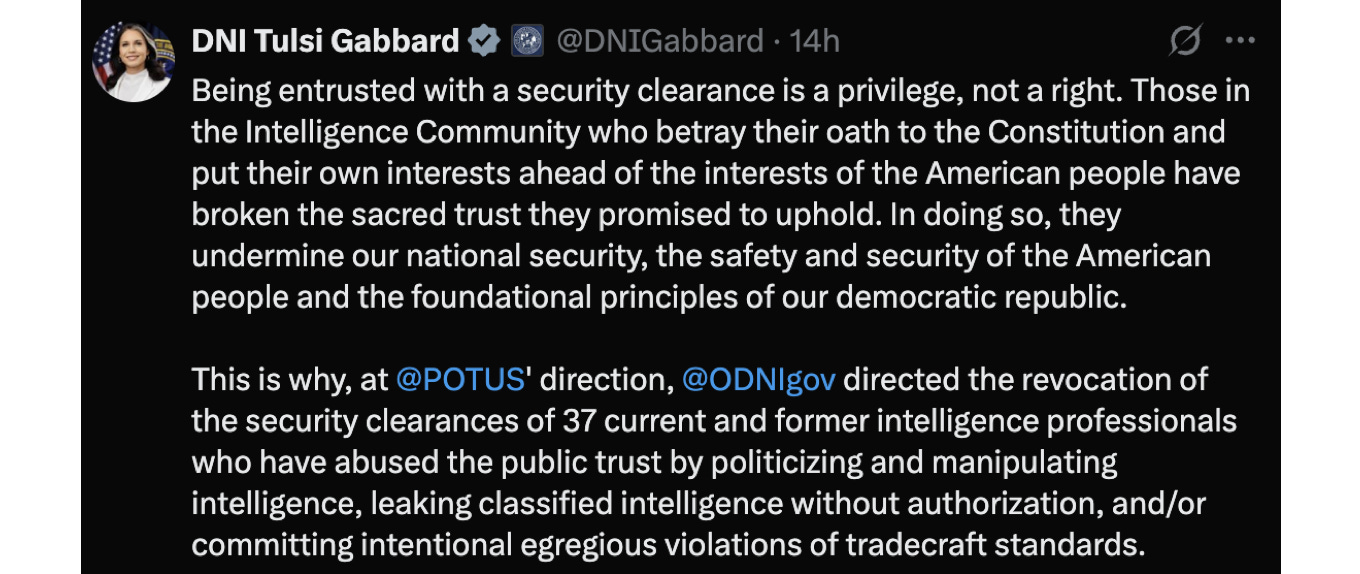
It wasn’t just security clearances. Gabbard ordered all contracts with the thirty-seven deep staters canceled as well, and ordered their credentials to be surrendered (if any). Tulsi named every person in her letter —including someone the Times called a “senior C.I.A. analyst currently serving undercover.” Not anymore.
Deploying classic Times faux journalism, senior reporters Maggie Haberman and Julian Barnes couldn’t scrounge up a single Republican voice, just Democrats murmuring that Trump’s “only” motive was to cover up Jeffrey Epstein. That’s right: the paper of record is peddling the theory that Trump handpicked 37 intel officials at random to distract the public from Epstein. How that math works, they didn’t say.
The theory advanced by the Times’s sources —without evidence— is a murky BlueAnon conspiracy theory that Trump specifically yanked these 37 intelligence officials’ playing cards for no reason was because it would trick the public into forgetting about the Epstein scandal. Somehow. The story wasn’t super clear about how.
“Gabbard’s move to yank clearances from a seemingly random list… is a reckless abuse… and another sad attempt to distract from the administration’s failure to release the Epstein files,” sighed Senator Mark Warner (D-Va.).
Sad!
Or, possibly, it was because these folks’ names were strewn throughout the newly declassified RussiaGate intelligence documents, under those little black redaction boxes. In other words, consequences. Just saying.

The Times’ story was a confusing hash of conflicting conspiracy claims. On the one hand, to prove how arbitrary Trump is, it argued forcefully that many of the people on the list had “reputations for nonpartisan work” (source undisclosed), some were promoted during Trump 1.0, and “not all had been critical of the Trump administration” (no examples provided). But on the other hand, it also argued that the whole affair was a Stalinesque partisan purge.
Well, which is it?
Tulsi’s purge wasn’t completely unprecedented. In 1977, with the intelligence community still reeling from the Church Committee’s findings, Carter’s newly appointed CIA director, Admiral Stansfield Turner, announced a massive downsizing of the Agency’s covert human operations branch in favor of signals intelligence. An eye-watering 212 clandestine service officers —mostly Cold War spies and field operatives— were given pink slips. Because the notices issued on the last day in October, CIA officers bitterly nicknamed it the Halloween Massacre.
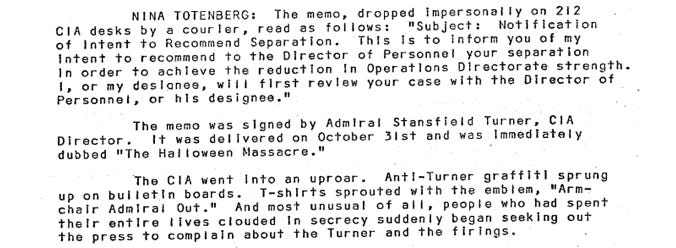
Not since the Halloween Massacre has Washington seen so many nameless operatives cashiered in a single stroke.
Either way, one thing is clear. For the first time in recorded memory, accountability is loudly knocking on the deep state’s door.
🔥🔥🔥
Yesterday, ABC ran a terrific story headlined, “Head of DOJ anti-weaponization group calls on NY AG Letitia James to resign“ Immediately framing the story in Trump’s opponents’ favor, the sub-headline furiously declared, “James’ attorney says the move by Ed Martin violates DOJ norms and ethics rules.”
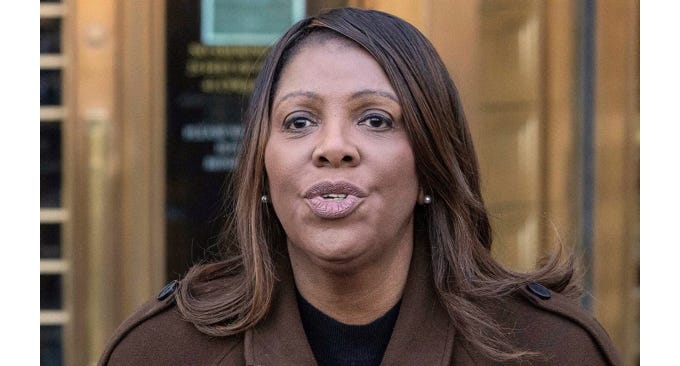
Not norms and ethics! We had no idea they were so concerned about norms and ethics, especially during Trump’s prosecutions. Now they tell us.
Ironically, though she now apparently thinks prosecutors should never talk about cases before trial, New York’s toadlike Attorney General Letitia James herself once called for Trump to be barred from business in New York, stripped of licenses, and politically destroyed before he’d exhausted his appeals. James’ big case against Trump focused on the notations on 34 check stubs —each prosecuted as separate crimes— that she claimed were “fraudulent” even though nobody was deceived.
New York judge Arthur Engoran, who has all the charisma of a ten-day-old corpse, bought her theory wholesale. He hit Trump with a record-shattering half billion in fines, and barred him from running his companies, turning bragging on balance sheets into the supposed “crime of the century.” (The case remains on appeal, frozen while Trump is in office.)
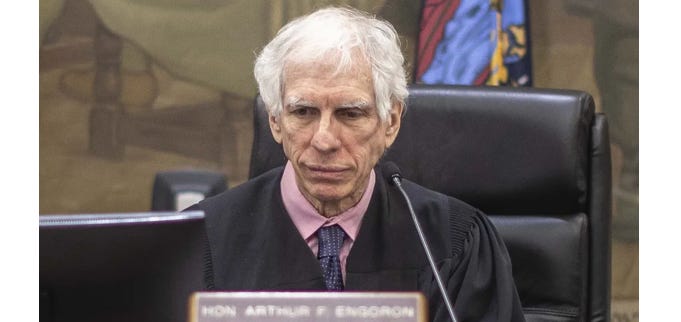
Now, media is crying about how yesterday, the DOJ’s new anti-weaponization czar, Ed Martin, sent James a letter asking her to resign for the good of the country. If their outrage can be rationally understood, they seem mostly upset that Martin didn’t wait for an indictment first.
But hilariously, and unreported by ABC, Martin’s letter was a response to a defiant letter that James’ lawyer sent Martin, but then leaked to the media. Martin only answered his letter. An even bigger chuckle arose from the letter’s second page, when Martin stressed, “I specifically ask that you redouble your efforts to not leak this confidential letter.”

In other words, James and her lawyer first broke protocol by leaking their own confidential letter. They probably leaked this one, too. But more interesting, and ignored by ABC, was Martin’s comment that, “On page 4, you make admissions about your client Letitia James’ conduct that are stunning to me.”
In that earlier letter (then addressed to Pam Bondi), James’s lawyer acknowledged that one document —a power of attorney form for a Virginia property— did “mistakenly” state that James intended to use it as her primary residence. He then provided a bunch of unseemly explanations about how other documents “clarified” the situation and proved James’s lack of intent to defraud anybody.
First, Martin’s call for James’ resignation seems actually to be a direct response to the admission that her own lawyer made, rather than, as ABC framed it, some rogue prosecutor trying to score political points for no reason.
But much more deliciously ironic, James built her entire New York fraud case against Trump on minor paperwork language— a few stray words on loan statements, valuations, and check stubs that she insisted proved a sweeping, decade-long scheme, even though nobody lost a dime. Her theory, and you can’t make this up, was that Trump personally benefited by shaving points off his loans because of allegedly inaccurate property valuations.
But her own lawyer just admitted that James herself falsely identified her property as her primary residence — a little paperwork fudge that also just so happened to score her… better interest rates. I mean, please. You couldn’t script it any better.
By her own standards, that’s not a clerical error. It’s decades of fraud.
Don’t blame me. Letitia James said it.
🔥🔥🔥
This morning’s New York Times carried an odd story headlined, “He Tried to Endorse From the Pulpit. He Wound Up Without a Church.” At first, it wasn’t obvious why the Times splashed it this extended, full-form, multimedia masterpiece about religion— its least favorite subject. But the real motivation quickly surfaced: Trump’s IRS cracked the door open for conservative pastors to endorse specific candidates. That terrifies the Times because it knows what happens if 300,000 American churches get political.

Talk about not reading the room. The Times’ “cautionary tale” highlighted the tragic tale of one Reverend Jonathan Barker, a wacky liberal pastor in Kenosha, Wisconsin, who instructed his flock to vote AOC in 2028, as the “what-would-Jesus-do” candidate. As it turns out, that decision appears not to have been inspired by any higher power. Probably it was a lower power. Subterranean.
It was over quickly. Pastor Barker’s small, right-leaning Wisconsin flock bounced him before he could get to next Sunday. Jonathan is now preaching to nine people in a rented event room, with a YouTube choir, and he’s still stubbornly pushing AOC. Not exactly a sacramental juggernaut.
But the Times wasn’t really profiling a kooky pastor who errantly delivered a bad sermon. No, they were really warning all churches. It’s worrying the Times. Conservatives are already mobilizing 18,000 pastors for next year’s midterms, while liberal denominations are mostly sitting it out. Even though Pastor Jonathan is a partisan lunatic with zero self-awareness, this story was intended to warn conservative pastors: you might lose your church!
But yappy Pastor Barker somehow missed the most obvious thing in the sanctuary: his own congregation and denomination weren’t interested in his own political thoughts. His church was already down to 20–30 regulars, at least half of whom (per Pew’s numbers) likely leaned Republican. Dropping an AOC-2028 endorsement into that bunch was like trying to sell tofu dogs at a NASCAR rally.
Not only that, but the Evangelical Lutheran Churches Association had just voted to keep to its long-standing no-endorsement policy, and warned its pastors not to jeopardize the denomination’s shared tax exemption. Barker ignored that and blasted out his sermonizing press release anyway.
“I am very proud, as a pastor, to endorse A.O.C. to be the love-your-neighbor presidential candidate,” he recently told the nine attendees in his new strip-mall church.
🔥 For seventy long, liberal years, the Johnson Amendment barred pastors from endorsing candidates from the pulpit under threat of losing their tax-exempt status. But last month, the IRS cracked that dam, announcing it won’t consider endorsements made during worship services to be political meddling. Translation: pastors can now say “Vote for X” in their sermons without risking their tax-exempt status.
Conservatives see it as a green light to mobilize thousands of churches, while liberal denominations (who never really followed the rules anyway) remain squeamish (according to the Times, anyway) — and the media is beginning to panic about what could happen in next year’s midterms, as conservative pastors help get out the vote in large numbers.
🔥 Beyond Pastor Barker’s barking at his unimpressed parishioners, the Times rounded up a rogue’s gallery of other liberal pastors making dire predictions about how badly the new rules could backfire. Reverend Bonnie Perry, an Episcopal Bishop, went further, hinting at divine retribution. She told the Times, “It’s never been about whether or not I’m going to lose my tax-exempt status … It’s whether I’m going to lose my prophetic status.”

It was the classic media strategy. Sow fear, uncertainty, and doubt. “Many pastors,” the Times gushed, “said they worried that endorsing candidates would drive away members, and drag their divine lessons into the mud of earthly politics.” Reverend Jihyun Oh, Presbyterian Church (U.S.A.) warned, “The power of the pulpit should not be used to make free debate feel unsafe.”

The Times’ pastors don’t exactly steer clear of politics, do they? (The story didn’t mention their activism, of course.)
The article didn’t quote a single conservative pastor welcoming the IRS rules change in their own voice. Or any conservative pastors at all. Instead, it mentioned two large conservative organizations, framing their barely detectable enthusiasm as a looming threat. “An arm of the Southern Baptist Convention,” the article warned, “said the I.R.S. statement would allow ‘religious leaders to minister more effectively to their congregations.’”
“The Family Research Council,” said the story, “is already trying to organize 18,000 pastors for next year’s midterm elections.” And that was it.
The only legal experts the story quoted warned that the new rules are murky and ambiguous (they aren’t), and pastors should err on the side of caution and restraint. But it cited no First Amendment advocates, no lawyers saying “this is a win for free speech,” and no legal voices calling the Johnson Amendment unconstitutional— even though that’s exactly what legal scholars have been saying since Johnson dreamed it up in a fit of partisan ardor.
🔥 In 1954, Lyndon B. Johnson was a U.S. Senator running for reelection in Texas. Two small nonprofit groups (anti-LBJ, but tax-exempt) were campaigning against him. Annoyed, Johnson slipped a short amendment into the tax code saying nonprofits — including churches — would lose tax-exempt status if they endorsed or opposed political candidates. It passed without any floor debate.
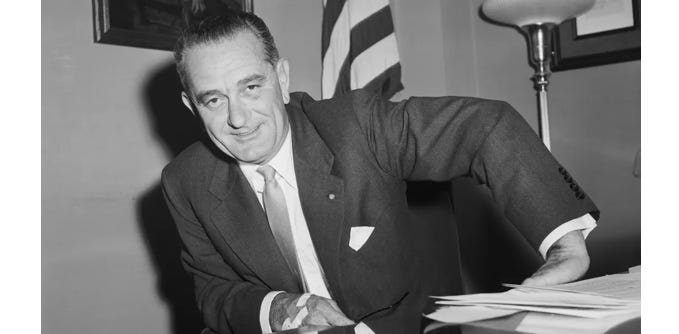
Ironically, Johnson wasn’t even targeting churches. His real beef was with the secular nonprofits hammering him in Texas. Churches just got swept in by the amendment’s broad language. Until that time, it was commonplace for churches to be involved in politics, as you can easily imagine. It only seems weird to us because we’ve all grown up under the shadow of Johnson’s stupid amendment.
The IRS has never prosecuted a church for breaking the Johnson rule. Not once. Last month’s rule change wasn’t even a change; it was a clarification. In July 2025, the IRS settled a lawsuit brought by Texas churches and broadcasters, effectively saying the Johnson Amendment’s ban doesn’t apply whenever a pastor endorses inside a worship service to his own congregation.
That means pastors can indeed sermonize to their own flocks — endorsements, political messaging, etc. — without fear of IRS action or government censorship. The concession was the least the IRS could have done in light of the First Amendment.
At the time, I predicted that the new rules would reset the nation’s politics and upset the Democrats’ rotten apple cart, since the old rules benefited the Donkey Party by suppressing religious conservative voting. For example, a 2023 Gallup poll reported that about 52% of Republicans say religion is “very important” in their lives, compared to only 22% of Democrats. Given how many column inches the New York Times devoted to a wacky liberal pastor with a nine-member “church,” I think the Times is worried.
Expect the heated debate about pastors endorsing candidates to continue rising as we approach the midterms. Pastors shouldn’t fall for it. It is legally safe to endorse candidates in their sermons.
🔥🔥🔥
Last week, the entire Editorial Board of the New York Times ran a remarkable op-ed titled, “Crime Keeps Falling. Here’s Why.” They claimed murders have dropped to a 65-year low, America is safer than ever, and Trump is flat-out lying when he calls D.C. a crime-ridden wasteland. But what they admitted was stunning.

I’m not exaggerating. The Editors conceded that national crime rates spiked in 2020, and then explained that pandemic fears, George Floyd’s drug overdose, and the January 6th protests made Democrats go crazy and take “a moral holiday.” So naturally, they started shutting down schools and churches, cheering on riots, flirting with “defund the police,” and declaring that normal laws, like not stealing shampoo from CVS, were oppressive and racist.
This Times reached deep into the thesaurus and labeled this teensy overreaction as anomie. But, the Editors assured readers, Democrats are now getting better. So.
You probably think I’m twisting their words or taking things out of context. No. They said it. Check out this remarkable paragraph penned by the Times’ entire Editorial Board:
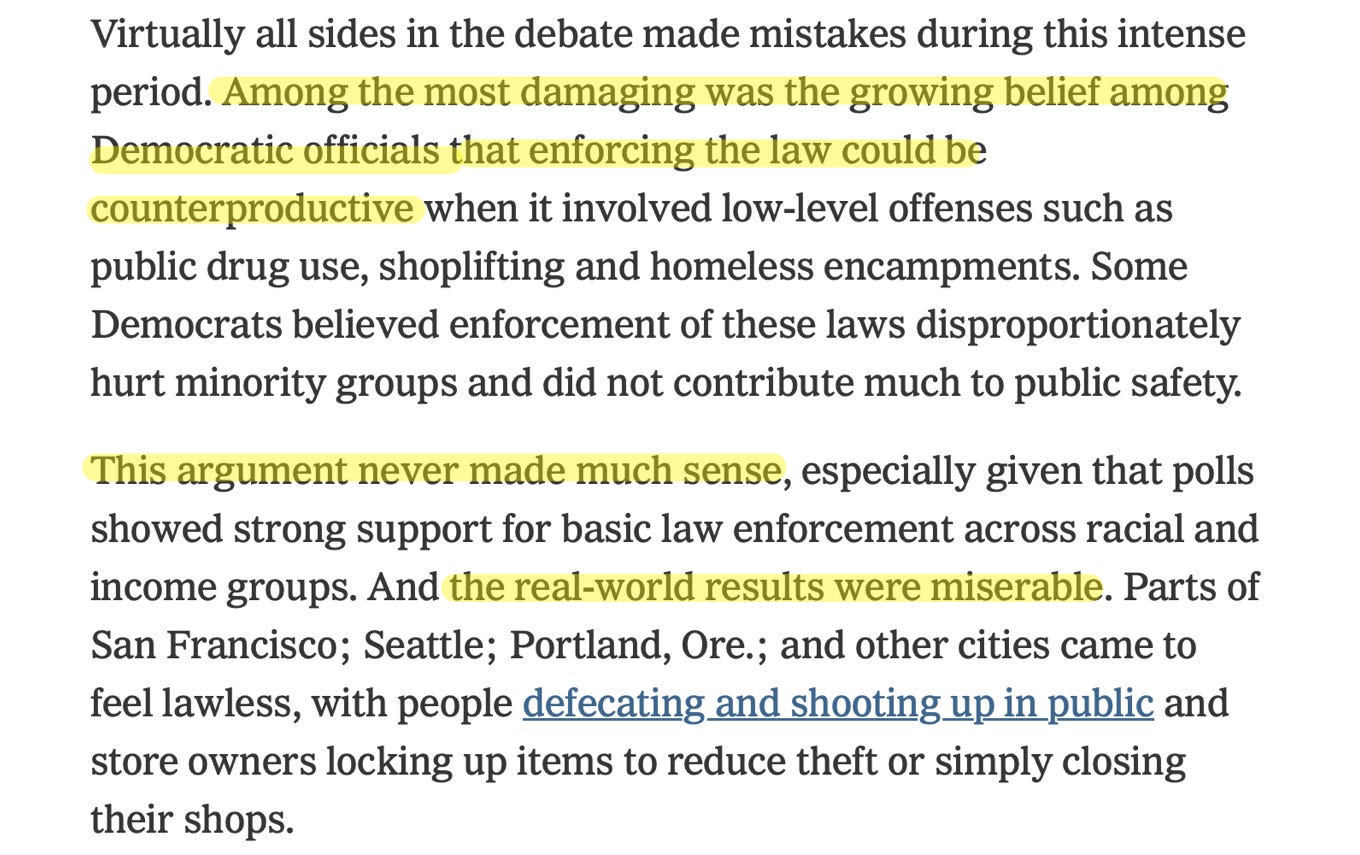
The first word in that cite, virtually, did a lot of heavy lifting. Although the Editors’ began with the claim that “virtually all sides in the debate made mistakes,” the editorial included not one concrete example of a GOP misstep. No Republican city, no Republican governor, no GOP policing initiative was ever called out. The only time Trump was even mentioned was at the end— to dismiss his claim that immigration drove crime trends. That’s it.
In other words, the Editorial Board claims that, while Democrats did create the crime problem, Republicans aren’t the remedy, since the problem is fixing itself. “The defund movement,” the Editors assured readers, “is now considered a failure, and many of its old backers have distanced themselves from it.” And, “some states, including California and Oregon, have rolled back laws that reduced penalties on low-level offenses.”
Haha, sorry. That’s wishing thinking. Democrats may have distanced themselves from legalized shoplifting, some, but their no-bail policies persist, and tolerance of open-air homeless camps and drug bazaars (just for a few examples) continue like a mostly peaceful riot at Walmart.
In short, this editorial was an extraordinary admission wrapped in a narrative rescue blanket, a devastating limited hangout desperately trying to inoculate the party before the midterms: They are terrified of running against “safety” or “crime.”
But the Times Editorial Board just reluctantly admitted, in black and white, that Democrats’ post-pandemic criminal justice experiments were disastrous. That’s not nothing— until now, they’ve been trying their best to gaslight readers with “GOP crime panic” stories.
The Democrats’ political problem is simple: no matter how many brave editorials they print, or how many crime charts they massage, none of it eclipses people’s lived experience. Every voter who must lunge past a wasted homeless man to enter the drugstore and then wait ten minutes for the clerk to unlock a plexiglass cage —just to buy toothpaste— is getting a daily reminder of the facts on the ground.
💉💉💉
The post-pandemic legal cleanup is turning into a bonanza of court rulings and settlements, and almost every story contains the word million. There are simply too many for me to keep up with. Here, for your enjoyment, is a buffet of headlines just from the last week. First, headline from Reuters, two days ago.

Next, also two days ago, this headline from Insurance Business:

In this case, the appeals court overturned the lower court, and held that a health club chain was entitled to a separate $1M insurance payout for each lockdown order in every jurisdiction with a club location, rather than just one single $1M claim for the pandemic in general. Ouch!
August 13th, a Chicago Tribune headline:

The million-dollar settlement with employees followed an EEOC investigation that found reasonable cause to believe that Mercyhealth discriminated against its employees based on their religion by denying their religious accommodation requests.
August 5th headline, Miami Herald:

I know. It’s so hard to imagine how someone could have found a scammy way to get rich off “emergency pandemic contracts.” More like this, please.
Finally, today, from Wisconsin local WBAC News:

This tragic case involves Grace Schara, 19, who the family claims was killed by Ascension Hospital, after lethal medication (remdesivir) and a shady do-not-resuscitate order that no one signed or approved. The fact it’s now before a jury means it survived all the hospital chain’s efforts to dismiss it and play games with discovery.
The rising tide of “pandemic consequences” is no longer theoretical — it’s being measured and priced out, in courtrooms, in the millions. Pick your saying: chickens coming home to roost, pandemic offenders hoisted on their own needle-like petards, FAFOs, or my favorite, karma’s a Nancy Pelosi.
It’s not just one industry or one grievance. Airlines (Qantas fines), insurers (Minnesota payout ruling), hospitals (vaccine mandate settlements, wrongful death suits), even outright fraudsters (South Florida scam) — they are all starting to face the legal reckoning.
The pandemic began with press conferences; it’s ending with verdicts and settlements — and the cost is counted in millions.
This wave of pandemic-era litigation will leave a deep imprint on corporate risk management, probably for decades. Companies can’t treat shutdowns, mandates, or mass firings as “acts of God” anymore. They’re seeing that decisions made under the banner of “emergency” will still get litigated later. Expect new policies on workforce reductions, medical mandates, and crisis protocols vetted by lawyers in advance. Emergency decisions won’t be left to “managers under pressure” — lawyers will be in the room, because everyone can now see what happens when courts and juries start attaching million-dollar price tags years later.
The pandemic is not “over.” Its consequences are now beginning to arrive on the courthouse steps, in larger and larger numbers, and in dollar amounts too big to ignore. This is the real long tail of covid: the legal Reckoning. I bet you never thought you’d live to see the day.
Don’t race off! We cannot do it alone. Consider joining up with C&C to help move the nation’s needle and change minds. I could sure use your help getting the truth out and spreading optimism and hope, if you can: ☕ Learn How to Get Involved 🦠
Twitter: jchilders98.
Truth Social: jchilders98.
MeWe: mewe.com/i/coffee_and_covid.
Telegram: t.me/coffeecovidnews
C&C Swag! www.shopcoffeeandcovid.com
The views expressed in this commentary are those of the author and do not necessarily reflect the official position of Citizens Journal Florida









